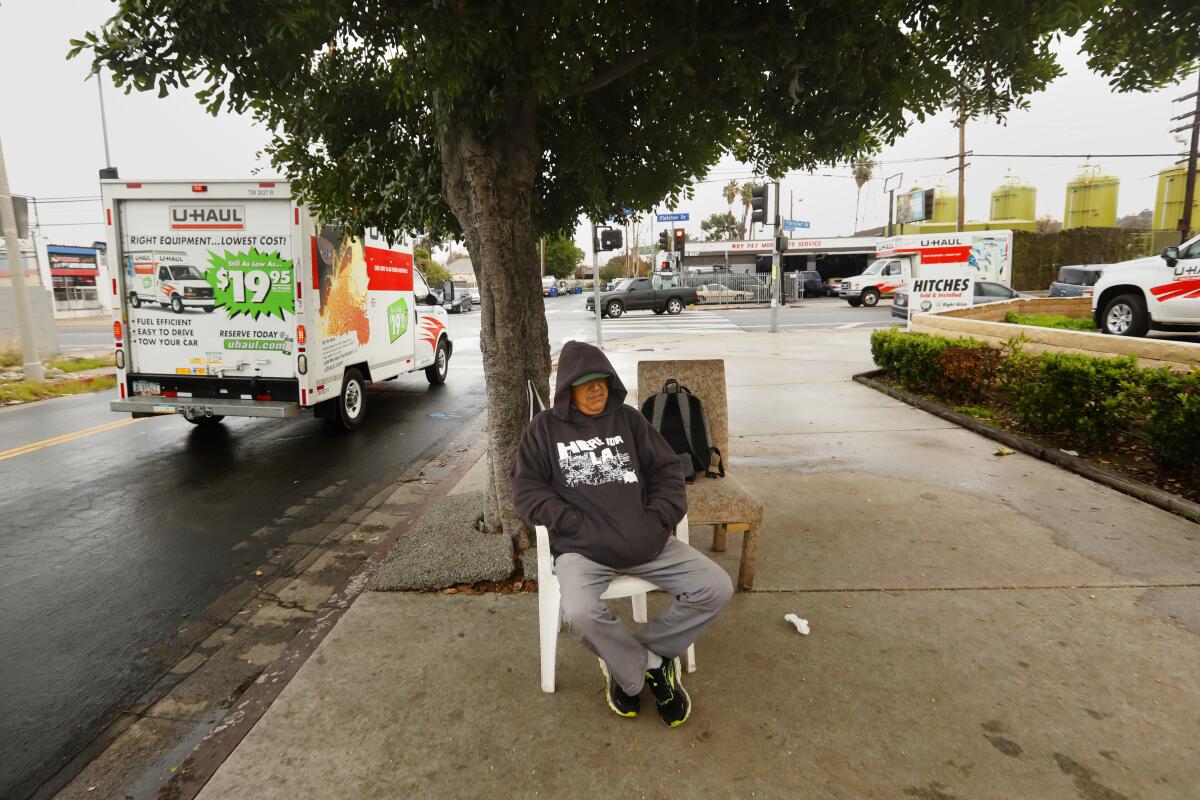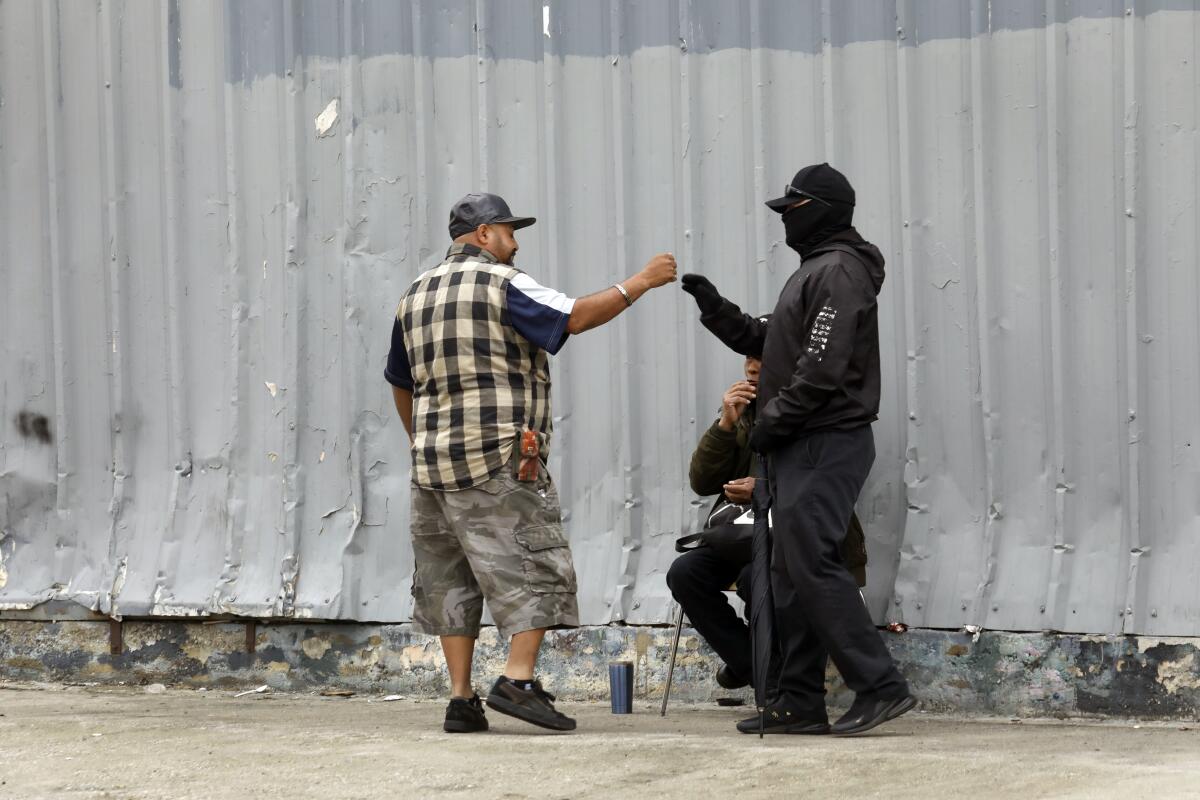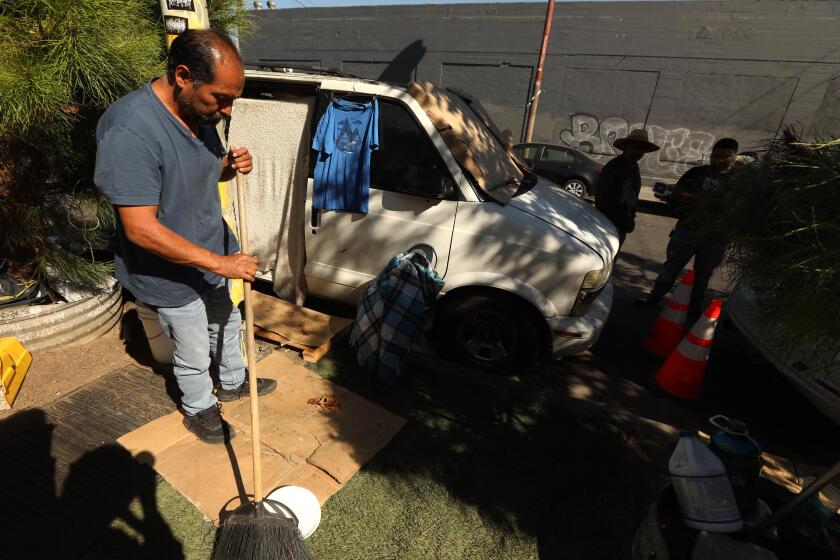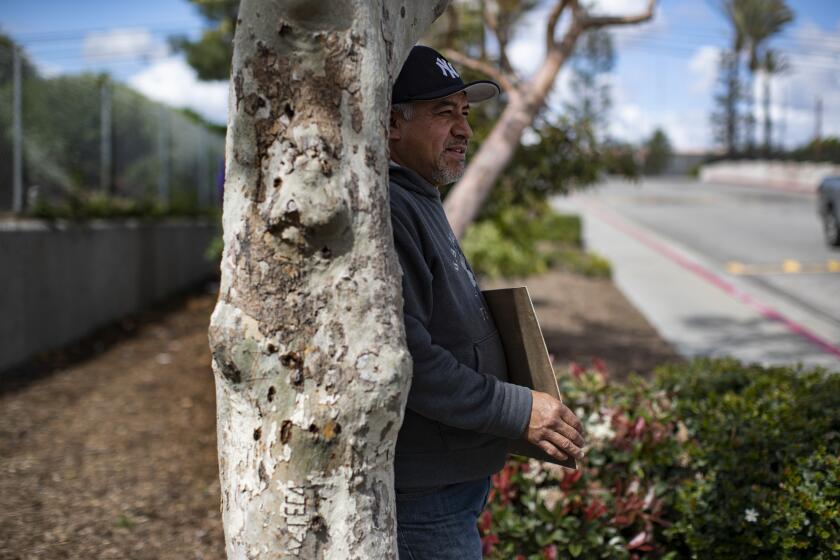On an L.A. street corner, day laborers struggle to recover from pandemic

On a cold Tuesday morning, Genaro Guerra biked to the U-Haul lot in Atwater Village praying to find work even though it had been 62 days since his last job.
This time of the year is stressful for Guerra, a 42-year-old day laborer from Guatemala. The men who often hire him for construction jobs head home to Mexico and Central America for the holidays. So Guerra pedals to Fletcher Drive and Larga Avenue, hoping to be hired as a mover.
Every day, low-wage workers show up at curbside hiring sites like this one, seeking work on construction projects, roofing installations and landscaping jobs. They are often immigrant men living in the country without documentation, making them susceptible to wage thefts and other unfair labor practices.
The economic downturn caused by the pandemic two years ago hit day laborers especially hard. They were exposed to the deadly virus at high rates, unable to stay home or collect unemployment payments. Until last year, most didn’t have access to health insurance. Now, high inflation and interest rates have made jobs more scarce, adding another layer of hardship, pushing many toward or into homelessness.
Homelessness among Latinos has shot up in Los Angeles County while other demographic groups have seen a decline over the last two years.
The slowdown was visible at the U-Haul storage and rental truck facility as Guerra and other jornaleros, as day laborers are called, watched customers come and go.
“People come here to pick up their U-haul trucks and leave,” Guerra said. “They don’t need us.”
He thinks people have less money today because of rising prices and opt to do the lifting themselves.
Before the pandemic, Guerra said, all he needed was one good day where he could score four jobs and make about $800. But now, it’s a miracle if he gets just one.
“All I want for the new year is for God to provide us with more jobs,” Guerra said. “More jobs means we can have money to pay rent and have some food to eat.”
Guerra prepares for this time of year by saving money he earns during the spring and summer. This year, he paid his rent two months in advance, but it drained his savings. He’s down to his last $300, and his monthly $800 rent is almost due. He’s now considering pawning three gold chains to get through next month.
He worries about becoming homeless and knows of some workers who now camp along the Los Angeles River.
Sitting on a folding chair, he shivers when a cold breeze cuts through his hooded sweatshirt and unleashes water from the tree he’s sitting under. His body stiffens when a water drop lands on the back of his neck. The sun is just breaking through the storm clouds. He lights up a cigarette.
The day’s hustle is just stirring up on the block — a strip of auto shops mostly, with side streets of small, fenced-off houses. A couple scavenges through recycling bins, pulling out plastic water bottles. Minutes later, another man goes through the same bins.

Gustavo Gutierrez shows up at 8 am, dabbing Guerra. The men talk about how difficult it is to find work. They can’t agree on how long ago it was that there were regular jobs.
A third man shows up, drinking coffee. He hears Guerra mention how beautiful the day is starting to look as he notices more sun and blue sky.
“Everything is beautiful and eternal,” the man says.
Guerra chuckles.
“Hay, miralo, tan profundo,” he said. Look at this guy, so deep.
Amused, Gutierrez, 65, smiles and shakes his head.
The men, in their endless wait, spend so much time talking to kill time that they cycle between mutual amusement and irritation.
In a soft and raspy voice, Gutierrez questions the man.
“What does eternal mean to you?”
“Everything, Guerra is eternal.”
“How so?”
“Well, when he dies his spirit remains,” the man says.
“So you think that tree over there is eternal? The chair?” Gutierrez says.
The topic loses its thread and the conversation fades off.
Day laborers in Los Angeles County are struggling to find work because of the recent rains and the coronavirus pandemic.
Guerra tries to keep his struggles to survive in context. From his standpoint, poverty in Los Angeles is nothing like poverty in Guatemala.
“We know the jobs we do pay little, but even with that, you can buy yourself several pairs of shoes, whereas in Guatemala, you can only afford one pair every two years,” Guerra said. “You earn so little that you can barely afford eggs.”
Poor and desperate for change, Guerra said he left Guatemala in 2003. He has worked various jobs but specializes in house framing. His only family in the U.S. is his 23-year-old son, who left five years ago to live with a woman in Texas.
“I haven’t really heard from him since he left,” Guerra said. “I would love to talk to him, but I don’t have a number for him.”
Since his son moved, he has lost his father to cancer and his mother to diabetes. When the holidays hit, he tries not to think about the losses and regrets of a hard life, but when he’s in his bedroom in a nearby house, drinking to ease his mind, he can’t help but think of his family.
“It hits me hard,” Guerra said. “I never got to see my parents before they died.”
Gutierrez listens as Guerra tells his story. He kept his hands in his pocket, trying to stay warm.
In the group, he is the oldest.
There are days he thinks about when he used to be young like them, when he could do just about any job. But now, it’s getting harder. He has prostate cancer, and the medicine he takes to keep it from spreading hurts his body.
“I’m old and sick now,” he says. “I can barely lift my arms, and I don’t know if it’s because of the medicine or just my age.”
It’s nearly 11 a.m. when Guerra pulls his cellphone out. He calls another worker in MacArthur Park, asking if there’s work.
“Hay jale?” he asked, Is there work?
He hears the man say, “Some.”
He tells the caller that he’ll be there around noon.
Another jornalero shows up as Guerra hangs up the phone. Guerra and Gutierrez start talking to the man, asking if he has managed to find work.
The man tells him he did a bricklaying job before the recent storm hit. It was his first time doing that work, so he earned only $40 for it.
“But now that you know how to do it, you can charge more next time,” Guerra tells the man.
Guerra crosses the street and sits around six other workers. The conversations are loud, with a lot of laughter. Guerra’s voice is the sharpest and loudest in the group. He is a natural-born talker, a barfly with no bar. After a half-hour, he is so distracted by the conversations that he misses the bus twice and never makes it to MacArthur Park.
The group of men eventually make their way to a round, wooden dining table. They sit on chairs that local residents have thrown out. For two hours, the men play poker and listen to music while continuing their conversations. A few drink beer.
Neighbors understand the men are there to find work but say they can be a nuisance, including sometimes urinating in public.
For now, a portable toilet used by construction workers remodeling two homes nearby has temporarily resolved that issue.
Guerra said neighbors have complained to them about the noise and drinking.
“It’s valid. I understand that,” he said.
He’s afraid that whoever moves into the remodeled homes may not want them in the area anymore.
Gutierrez said that fear is partly why he tries to distance himself from the others. He thinks when they’re being a nuisance, it’s harder for them to land jobs.
“I come here and try to just find work,” he said.
That Tuesday, none of them did. But the next morning, as it sprinkled, the men showed up to give it another try.
More to Read
Sign up for Essential California
The most important California stories and recommendations in your inbox every morning.
You may occasionally receive promotional content from the Los Angeles Times.













